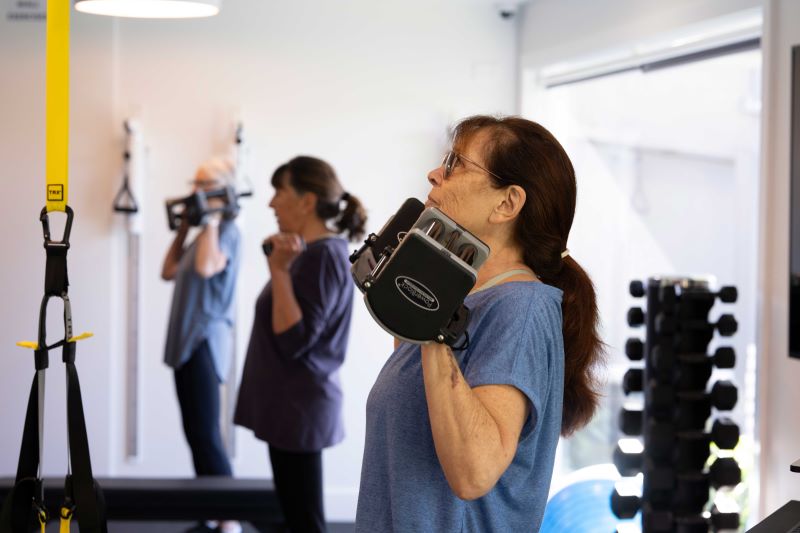
Why Your Exercise Program Might Not Be Improving Your Bone Density: The Importance of Professional Guidance
Maintaining healthy bone density is crucial for overall well-being, especially as we age. For those dealing with osteoporosis or at risk of bone density loss, the right exercise program can make a significant difference. However, many individuals unknowingly follow exercise routines that fail to address bone density effectively. In this blog, we’ll explore why professional advice from physiotherapy and exercise physiology experts is essential for enhancing bone density, and how a tailored program can make all the difference.
Understanding Bone Density and Osteoporosis
Bone density refers to the amount of bone mineral content in a given area. High bone density typically means stronger bones, while low bone density is associated with conditions like osteoporosis. Osteoporosis is a condition where bones become porous and brittle, increasing the risk of fractures. This often occurs due to the loss of bone mass and density, which can be influenced by various factors including age, genetics, and lifestyle.
Regular exercise is a critical component in managing and improving bone density. However, not all exercises are equally effective for this purpose. To understand why, it’s important to recognise the specific types of exercise that impact bone density and how they should be incorporated into your routine.
Why Many Exercise Programs Fall Short
Many conventional exercise programs, particularly those designed for general fitness, do not adequately address the needs of individuals with low bone density or osteoporosis. This is often because these programs focus primarily on cardiovascular health or muscle strength without emphasising bone-specific exercises.
Here are a few common pitfalls in typical exercise routines when it comes to bone density:
-Lack of Weight-Bearing Exercises: Bone density is improved through weight-bearing exercises that force the bones to work against gravity. Activities like running, dancing, or weightlifting are effective in stimulating bone growth. Many general fitness programs may not include these exercises or may not incorporate them in a way that maximizes their benefits for bone health. The other problem is that these exercises can come at the risk of causing injury, or flare up of chronic conditions like arthritis. A carefully structure resistance training program will help to avoid these issues.
-Insufficient Load and Resistance: To stimulate bone density, exercises need to apply an appropriate amount of load and resistance. Simple bodyweight exercises may not provide enough of a challenge to significantly impact bone density, especially if the exercises are performed without progressive overload. Exercise Physiologists are trained to prescribe the correct loads and progressively increase them to address bone density.
-Inadequate Focus on Balance and Coordination: Falls and fractures are a significant concern for individuals with osteoporosis. Exercise programs that do not include balance and coordination training may not address the risk of falls, which is a critical component of managing osteoporosis effectively.
The Role of Physiotherapy and Exercise Physiology
To address these issues and create an effective exercise program for improving bone density, professional guidance from physiotherapy and exercise physiology experts is essential. Here’s why:
–Customised Programs: Physiotherapists and exercise physiologists are trained to assess individual needs and design exercise programs tailored specifically to those needs. For someone with osteoporosis, this means creating a program that incorporates weight-bearing exercises, resistance training, and balance exercises in the right proportions to enhance bone density safely.
–Expertise in Safe Exercise Techniques: Professionals in physiotherapy and exercise physiology are well-versed in the techniques required to perform exercises safely and effectively. They can ensure that exercises are performed with proper form and technique to maximise benefits and reduce the risk of injury
-Progressive Overload: Experts understand how to gradually increase the intensity and load of exercises to continually challenge the bones and stimulate growth. This progressive approach is crucial for making sustained improvements in bone density.
-Monitoring and Adjustment: An effective exercise program is not static. Physiotherapists and exercise physiologists can monitor progress and make adjustments as needed to ensure the program remains effective and aligned with changing needs or health conditions.
How to Get Started
If you’re concerned about bone density or managing osteoporosis, consulting with a physiotherapist or exercise physiologist is a wise step. They will perform a comprehensive assessment and create a personalised exercise plan designed to improve bone density while addressing any other health concerns.
Remember, while general exercise routines offer numerous health benefits, a specialised program tailored by professionals is crucial for achieving significant improvements in bone density and effectively managing osteoporosis.
At Holistic Physio Fitness in Mona Vale, our team of expert physiotherapists and exercise physiologists is dedicated to helping you achieve optimal bone health through customised, evidence-based exercise programs. Contact us today to schedule a consultation and take the first step toward a stronger, healthier you.
By prioritising professional guidance in your exercise regimen, you can ensure that your efforts are not just beneficial but specifically designed to enhance your bone density and overall health. Find more information here

